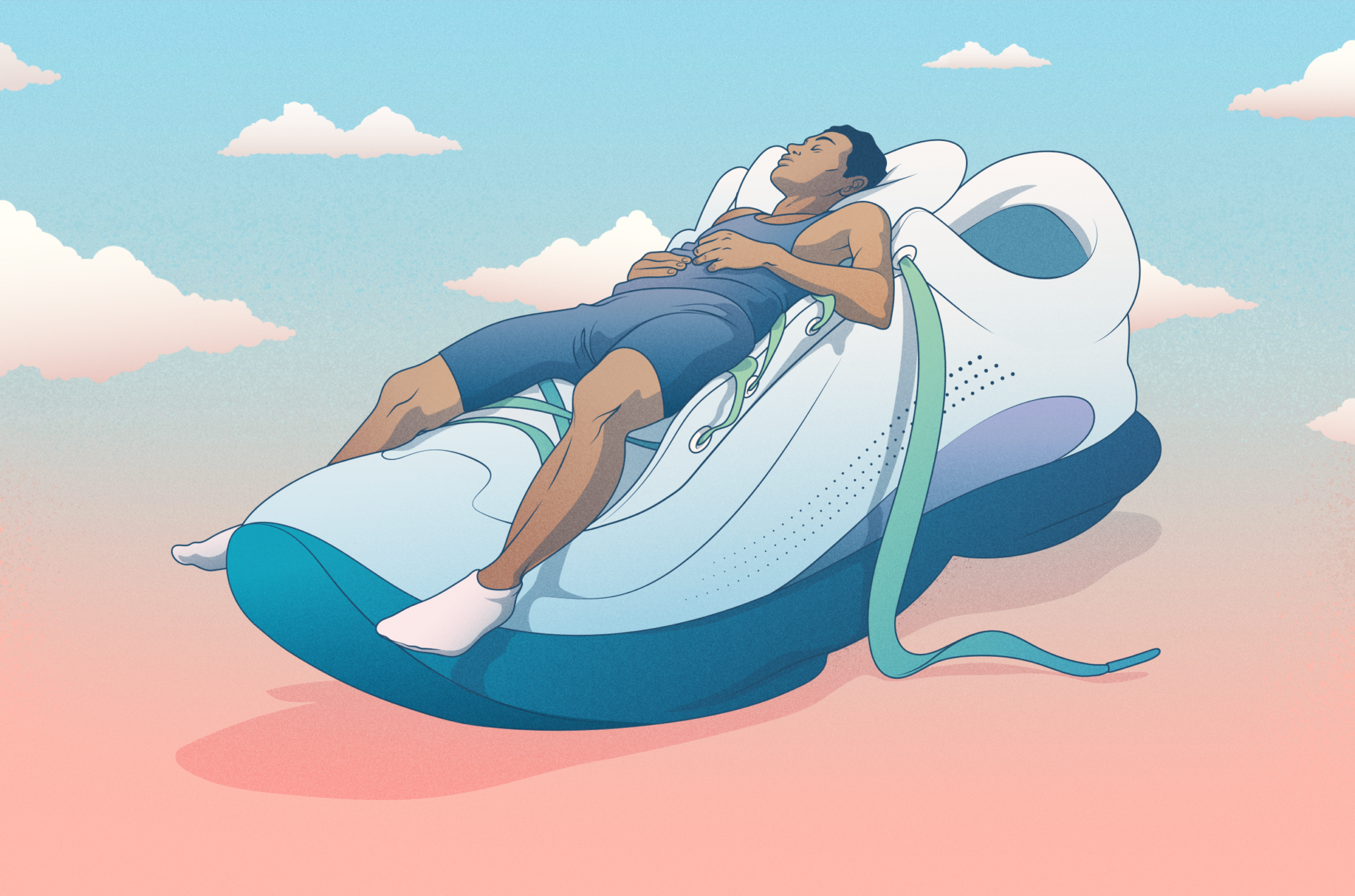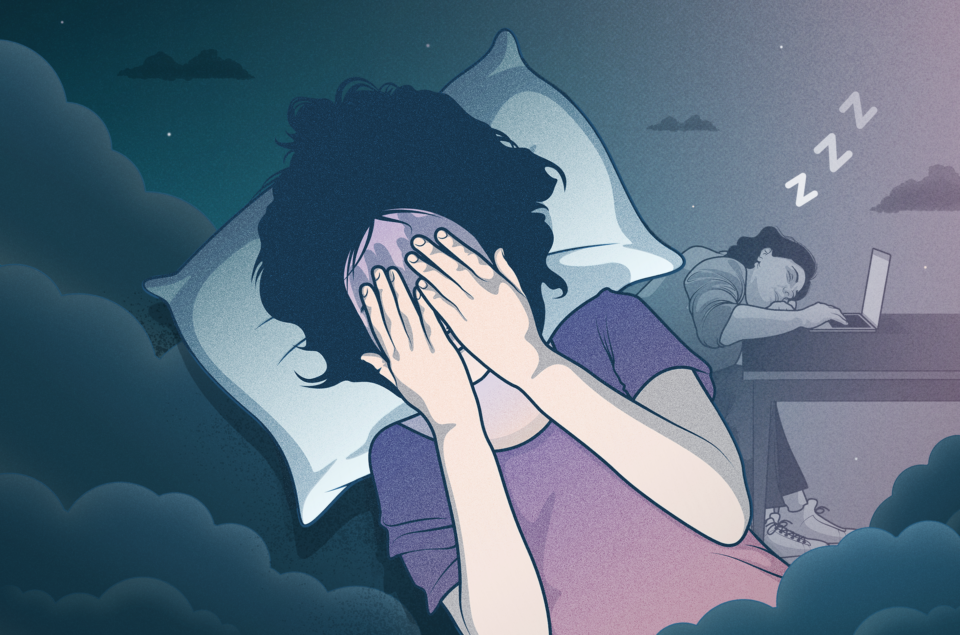Top performing athletes do it. New mothers do it. Napping is an effective way to rejuvenate both the body and mind and can be especially beneficial for those who engage in regular physical activity – or simply try to build a steady fitness regimen while sleep deprived.
In this two-part series, our very own sleep expert, Ph.D. and clinical psychologist Li Åslund, will explore the benefits of napping for exercise, and answer some common questions about incorporating naps into your fitness regimen.
In this article, we’ll cover:
- How power napping can enhance your workout routine
- When is the best time to workout?
- Tips and best practices for power napping
- Summary FAQs
How power napping can enhance your workout routine
Power napping has numerous benefits for the body, including improved cognitive function, reduced stress, and enhanced physical performance. A 2021 review study on daytime ‘napping’ and physical performance found that a 20-90 minute nap improved alertness, reaction time, and memory recall in athletes. Napping before exercise can also increase energy levels, leading to greater focus and intensity during the workout.
Furthermore, napping can help to reduce inflammation and soreness in the muscles. This anti-inflammatory effect can lead to faster recovery, allowing individuals to perform at their best in subsequent workouts.
“Something you always hear as a mum is to sleep when the baby sleeps. So instead of cleaning up after lunch, I decided to take a nap with my baby. During my afternoon run, I notice that my body feels lighter than it has in a long time, and decide to go for an extra couple of kilometers”, Li’s journal, Day 35.
The top question: napping before or after the workout?
The optimal timing of napping in relation to exercise depends on the specific goals of the individual. Li explains, “If your goal is to improve your performance during the workout, napping before exercise may be beneficial.” This is because napping has been shown to increase alertness and energy levels, leading to greater focus and intensity during exercise. She continues, “On the other hand, if the primary goal is to promote recovery and reduce soreness, napping after exercise may be more effective.”
Do naps also help muscle recovery?
“Yes, napping can be an effective tool for muscle recovery. During sleep, the body releases hormones such as growth hormone, which is essential for muscle recovery,” says Li. Optimal muscle recovery and build requires 7-9 hours of sleep at night because an impressive 70% of the restorative growth hormones are naturally released during REM sleep. High-performing athletes often struggle to meet that nightly sleep goal because of competitions, traveling and general stress. Longer naps help meet their need for adequate restorative, deep sleep.
Additionally, napping can help reduce the production of stress hormones, such as cortisol, which can inhibit muscle growth and recovery. Napping can also help to reduce inflammation and oxidative stress, two processes that can contribute to muscle damage and fatigue.
Will I gain weight if I sleep after exercise?
“No, sleeping after exercise will not cause weight gain. In fact, sleep is an essential component of weight management, as it regulates hormones (such as leptin and ghrelin), which control appetite and metabolism,” explains Li. It’s also already established that sleep deprivation is associated with increased caloric intake and a greater risk of obesity.
When is the best time to workout?
The optimal time to work out depends on a variety of factors, including individual preferences, schedules, and circadian rhythms. “Exercise in the morning often leads to greater adherence and consistency, because people are less likely to have conflicting schedules and interruptions in their morning routine”, Li points out. Early morning exercise can also help reduce insomnia, especially for those who wake up and struggle to return to sleep on the later part of the night.
Rigorous exercising closer to bedtime can have a negative effect on your sleep. However, low-key evening workouts have been shown to improve sleep quality and reduce stress levels, which may be beneficial for those with high-stress lifestyles.
Is it okay to work out at night?
“Working out at night can be an effective way to promote relaxation and unwind from the stresses of the day. But be mindful of your circadian rhythm and the intensity of the workout,” says Li. High-intensity exercise can stimulate the body, leading to a release of hormones such as adrenaline, which can disrupt sleep. Therefore, it is recommended to avoid high-intensity exercise in the hours leading up to bedtime and to listen to the body’s cues when determining the timing and intensity of evening workouts.
Tips and best practices for power napping
To reap the benefits of power napping, it’s essential to follow some tips and best practices:
- Keep naps 20-30 minutes, as longer naps can lead to sleep inertia, leaving you feeling groggy and sluggish.
- 30-90 minute naps may be beneficial for athletes who are sleep deprived and who need optimal muscle growth and repair. Allow 30 minutes to recover from sleep inertia prior to training or competition for better performance.
- Create a relaxing sleep environment, including comfortable bedding and a cool, dark room.
- Try to nap at the same time each day, as this can help to regulate the body’s circadian rhythm and improve overall sleep quality.
- The best time to nap is between 1 p.m. – 3 p-m. when most of us experience a natural dip in energy.
Looking for additional tips? You can get personalized insights into your sleep with the Sleep Cycle app.
Why do you feel sleepy after a workout?
It’s common to feel energy levels drop after a workout. In general, this occurs because of:
- High-intensity workouts cause your muscles to run out of energy. Your central nervous system also loses its ability to keep moving your muscles. This causes muscle fatigue, making you feel tired.
- Poor sleep quality or inadequate sleep. It’s essential to ensure that you’re getting enough restful sleep each night, as this can have a significant impact on energy levels and overall well-being.
- Inadequate food prior to workout: fuel your body properly before and after exercise, as low blood sugar levels can also contribute to feelings of fatigue.
Li’s takeaway on napping and exercise
Incorporating power naps into a workout routine can have numerous benefits for the body, including improved cognitive function, reduced stress, and enhanced physical performance. “It definitely helped my motivation and my running performance when I prioritized naps”, Li concludes.
Track how your exercise improves your sleep quality with Sleep Cycle
Summary FAQs
Nap before or after workout: which is the best?
This depends on the specific goals of the individual. If your goal is to improve your performance during the workout, napping before exercise may be beneficial. On the other hand, if your goal is to promote recovery and reduce soreness, napping after exercise may be more effective.
Do naps help muscle recovery?
Yes, napping can be an effective tool for muscle recovery. During sleep, the body releases hormones such as growth hormone, which is essential for it. However, optimal muscle recovery and growth requires 7-9 hours of sleep at night.
Will I gain weight if I sleep after exercise?
No, that’s a myth. In fact, sleep is an essential component of weight management, as it regulates hormones (such as leptin and ghrelin), which control appetite and metabolism.
Is it okay to workout at night?
Working out at night can be an effective way to promote relaxation and unwind from the stresses of the day. However, be careful – high-intensity exercise can stimulate the body, leading to a release of hormones such as adrenaline, which can disrupt sleep.
Why do I feel sleepy after exercise in the morning?
Muscles to run out of energy, poor sleep the night before or inadequate food after your routine may be the main reasons why you can feel sleepy after exercise in the morning.
Previously: Exercise and Sleep Series (1) – Sleep deprivation and exercise: should you exercise if you feel run down?










